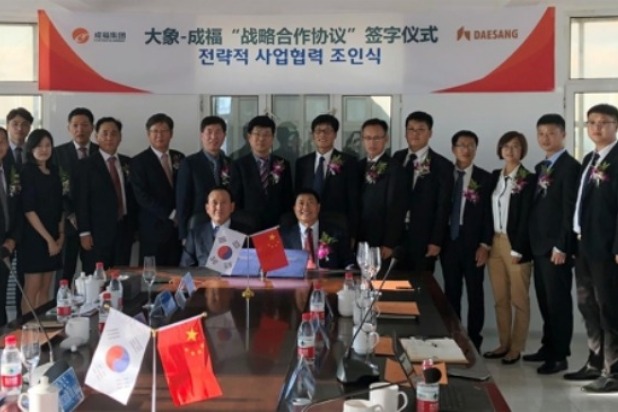Korea’s Daesang and China’s Heilongjiang Chengfu Food Group signed a strategic business cooperation deal in 2018
South Korea’s food giant Daesang Corp. has retracted its bid to acquire a controlling stake in China’s leading food additives maker Heilongjiang Chengfu Food Group Co. amid a slowdown in the amino acid product market.
Daesang said in a regulatory filing on Thursday that it is revising its announced plan in 2021 to acquire a 32.87% stake in Chegfu Food for 26.5 billion won ($20.1 million) to expand its presence in China’s lysine market.
Under a contract the two companies signed in August 2021, Daesang had the right to raise its stake in the Chinese lysine manufacturer to as high as 51% for management control within 42 months of completing the payment of 26.5 billion won.
However, Daesang said on Thursday it now plans to acquire only 20% of Chengfu Food for 8.84 billion won by Sept. 7.
In Thursday’s filing with Korea’s Financial Supervisory Service, Daesang also revised the purpose of its stake purchase to “use of the Chinese factory as an amino acid supply base through a minority stake investment” from its earlier statement of “expansion of the amino acid business by acquiring a production base in China.”
Daesang is Korea’s largest food and beverage company
NOT INTERESTED IN MANAGEMENT CONTROL
Daesang said in the filing that it deleted the clause concerning its rights to acquire additional stakes in Chengfu Food ahead of others.
“We had to make changes to our deal given the sluggishness of the lysine business in China. Through our minority stake investment, however, we will continue cooperating with Chengfu Food in functional amino acid products such as L-arginine for feed and L-tryptophan,” said a Daesang official.
Lysine is an essential amino acid added to animal feed for pigs, chickens and other livestock growth.
Arginine and tryptophan are amino acids that help humans and animals build protein in their bodies.
China is the world’s largest pork-consuming country, meaning it is also one of the industry’s top lysine producers and importers.
With the slowdown of the Chinese economy, however, the average price of lysine fell from 2,453 won per kilogram at the end of 2022 to 2,007 won at the end of September 2023.
A Daesang Life Science researcher
DELAY IN FULL EXPANSION OF LYSINE BUSINESS
Daesang, the producer of globally renowned kimchi products under its Jongga brand, saw its operating profit fall 11.6% to 123.7 billion won in 2023 from the previous year while its sales increased a mere 0.6% to 4.11 trillion won amid a food industry downturn.
The company, which produces lysine in Korea, saw its Gunsan plant operating rates fall to 78.6% last year from 82.1% a year earlier. Its food additives business swung to losses last year.
CJ CheilJedang Corp., Korea’s top lysine manufacturer, considerably slashed its lysine production from its amino acid product factory in China due to weak demand.
Industry officials said Daesang’s decision to cut its investment in Chengfu Food will negatively affect its goal to expand its bio and non-food businesses.
Daesang’s Jongga kimchi has been the market leader since 1988
Daesang is Korea’s first lysine producer, entering the business in 1973. However, the company sold the lysine business to Germany’s BASF for $600 million during the 1997 Asian financial crisis.
BASF later sold the business to Paik Kwang Industrial Co., a Korean chemical and biotech company. Paik Kwang sold the lysine business to Daesang for 120 billion won in 2015.
When Daesang transferred its lysine technology to China’s Chengfu Food in 2018, it also signed a strategic business alliance with the Chinese company for a global expansion.
At the time, the two companies agreed to expand their annual lysine production to 700,000 tons from 500,000 tons with a combined annual lysine sales goal of 2 trillion won by 2022.
Write to Hyeong-Ju Oh at ohj@hankyung.com
In-Soo Nam edited this article.
